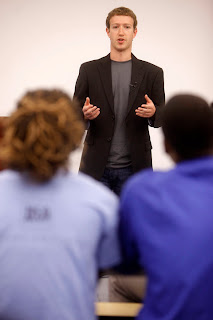 |
| Prior students made and published an eBook. |
Currently we've been brainstorming having our students get into teams to research, prepare, and publish an eBook about key issues in changes to education today -- all from the historical vantage point of digital civilization. This idea stems from the success that my students had in Spring, 2011, producing Writing About Literature in the Digital Age. After blogging through various related issues on the topic, they each produced a chapter for this eBook, which we then launched in a public webinar. This has led to some good things, such as NYU PhD Candidate, Anna Smith, using our book as a way to structure her own experiments in teaching writing digitally. This constructive response encourages Daniel and me to repeat and perfect that experiment. We'll have more to say about that as our ideas form and as we involve our students in planning.
A second idea is to have our students participate in online conferences, such as the Global Education Conference or the Library 2.011 Virtual Worldwide Conference, both happening in November, 2011. First, students could virtually attend just such a conference. This could get them launched very quickly into present conversations on key topics and give them an idea for how they could, in turn, participate later by presenting their own ideas at such an event.
 I'm glad that one of the themes of the Global Ed conference is authentic learning. Daniel and I believe strongly in breaking through the artificial barriers of academic courses and getting students involved in influencing their evolving world. We can do so very easily today, and as students realize they have both a stake in and a voice in these matters, then suddenly the history we research and the concepts about digital culture we explore will obviously be relevant.
I'm glad that one of the themes of the Global Ed conference is authentic learning. Daniel and I believe strongly in breaking through the artificial barriers of academic courses and getting students involved in influencing their evolving world. We can do so very easily today, and as students realize they have both a stake in and a voice in these matters, then suddenly the history we research and the concepts about digital culture we explore will obviously be relevant.Another source for such conferences is educational webinars.



